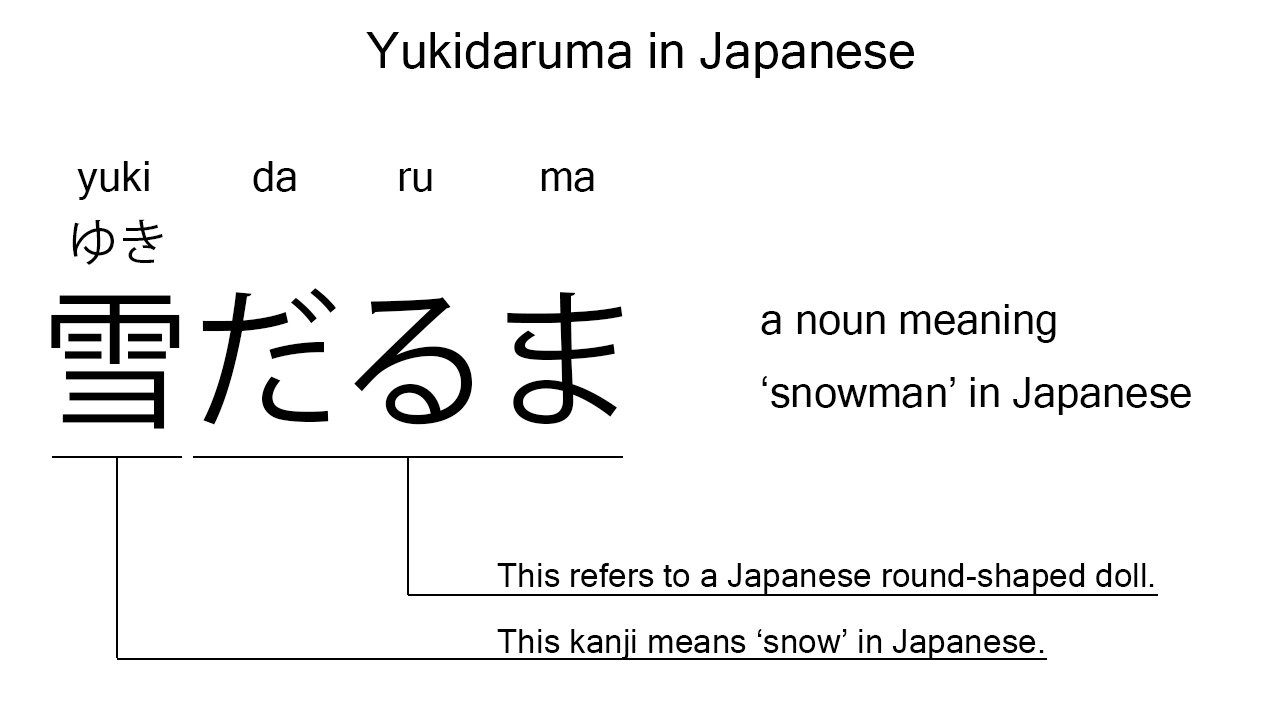What does “yukidaruma” mean in Japanese?
Native speakers say “yukidaruma” to mean ‘snowman’ in Japanese. Perhaps, some Japanese learners know this word as it is sometimes used in Japanese movies, songs, novels, manga, anime, and the like. In this blog post, however, I will explain this word in detail based on its grammatical components. And also, I will explain how to use it through example sentences. My explanations would help Japanese learners understand “yukidaruma” more clearly. Then, let’s get started!
Contents
Definition and meaning of “yukidaruma”
Let me start with the definition and meaning of “yukidaruma”.
- yukidaruma – 雪だるま (ゆきだるま) : a noun meaning ‘snowman’ in Japanese. This can also work as plural. Learn more about Japanese plural.
The definition and meaning are simple and clear. To understand this noun more clearly, however, let me explain its grammatical components in detail, one by one.
What does “yukidaruma” literally mean?
“Yukidaruma” consists of the following two components:
- yuki – 雪 (ゆき) : a noun meaning ‘snow’ in Japanese. This noun can also be found in other words like “fubuki“.
- daruma – だるま : a noun used to refer to a Japanese round-shaped doll.
These two components tell us that the formed noun literally means a ‘Japanese round-shaped doll made of snow’ in Japanese. This literal interpretation is very close to the actual meaning. Snowmen are often round-shaped dolls made of snow.

When we meet new Japanese words, we should check their grammatical components in detail to understand their meanings clearly and deeply. In many cases, components tell us a lot about the meanings of the words they form. Actually, here, we could get the better understanding of “yukidaruma” through the detailed check above.
So far, I’ve explained the definition and meaning of “yukidaruma” together with its grammatical components. Then, let me explain how to use it through the example sentences below.
Example #1: how to say “snowman” in Japanese
boku no imouto wa kinou yukidaruma wo tsukut ta – 僕の妹は昨日雪だるまを作った (ぼくのいもうとはきのうゆきだるまをつくった)
My little sister made a snowman yesterday.
Below are the new words used in the example sentence.
- boku – 僕 (ぼく) : a pronoun meaning ‘I’ in Japanese. This is used mainly by boys and young males.
- no – の : a case particle used after a noun or pronoun to make its possessive case. In the example, this is used after “boku” to make its possessive case, “boku no”, which means ‘my’ in Japanese.
- imouto – 妹 (いもうと) : a noun meaning ‘little sister’ in Japanese. This can also work as plural.
- wa – は : a binding particle working as a case marker or topic marker. In the example, this works after “boku no imouto” to make the subject in the sentence.
- kinou – 昨日 (きのう) : a noun meaning ‘yesterday’ in Japanese. This can also work as an adverb almost anywhere in a sentence. In the example, this works as an adverb in the middle of the sentence to say “yesterday” in Japanese.
- wo – を : a case particle used to make the object word in a sentence. In the example, this is used after “yukidaruma” to make the object in the sentence.
- tsukut – 作っ (つくっ) : one conjugation of the verb, “tsukuru“, which means ‘to make’ in Japanese. In the example, it has been conjugated for the better connection with its following word.
- ta – た : an auxiliary verb used after a verb, adjective, or auxiliary verb to make its past tense form. In the example, this is used after “tsukut” to make its past tense form, “tsukut ta”.
This is a typical usage of “yukidaruma”. In the example, it works together with the case particle, “wo”, to become the object in the sentence.
Example #2: another usage of “yukidaruma”
kanojo wa yukidaruma ga suki desu – 彼女は雪だるまが好きです (かのじょはゆきだるまがすきです)
She loves snowmen.
Below are the new words used in the example sentence.
- kanojo – 彼女 (かのじょ) : a pronoun meaning ‘she’ in Japanese.
- ga – が : a case particle used to make the subject word or the object word in a sentence. In the example, this is used after “yukidaruma” to make the object in the sentence.
- suki – 好き (すき) : the stem part of the na-adjective, “sukina”, which means ‘favorite’ in Japanese. Native speakers, however, often use this as an individual word to mean ‘to like’ or ‘to love’ in Japanese. In the example, this is used to mean ‘to love’.
- desu – です : an auxiliary verb used after a noun or adjective to make it polite. Probably, this is well known as a part of Japanese desu form. In the example, this is used after “suki” to make it sound polite.
This is another typical usage of “yukidaruma”. When we want to mean a ‘snowman’ or ‘snowmen’ in Japanese, this noun is always a very good option.
Summary
In this blog post, I’ve explained the definition and meaning of “yukidaruma” in detail based on its grammatical components. And also, I’ve explained how to use it through the example sentences. Let me summarize them as follows.
- yukidaruma – 雪だるま (ゆきだるま) : a noun meaning ‘snowman’ in Japanese. This can also work as plural. This noun literally means a ‘Japanese round-shaped doll made of snow’ in Japanese. This literal interpretation is very close to the actual meaning. Snowmen are often round-shaped dolls made of snow.
Hope my explanations are understandable and helpful for Japanese learners.